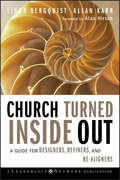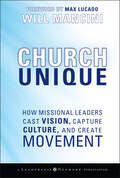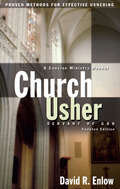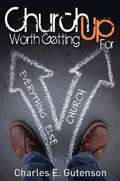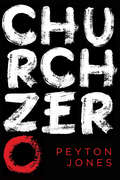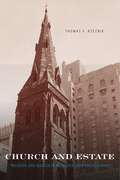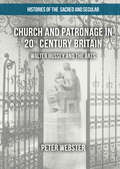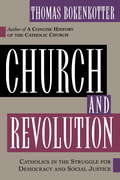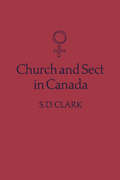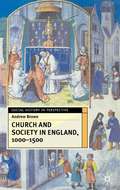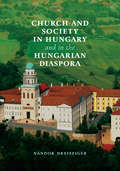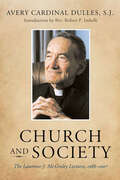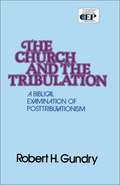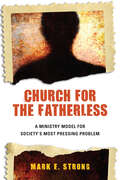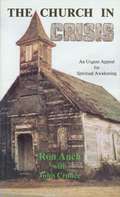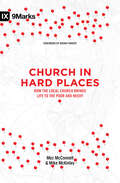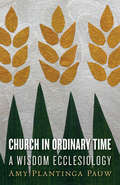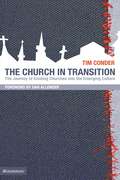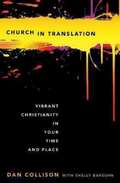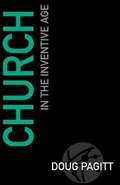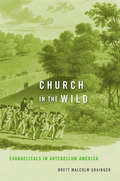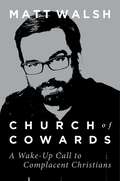- Table View
- List View
Church Turned Inside Out
by Allan Bergquist Linda KarrA design-thinking book for planting or redesigning churches and incubating a new generation of leaders. Written by Linda Bergquist and Allan Karr, two experienced church planters and mentors, the book is full of wisdom, practical advice, and creative counsel. Instead of a business-model-as-usual approach, the authors challenge readers to begin with the raw materials of beliefs, values, individuals, teams, and culture, and to then move outwards to draw from a rich palette of real and potential church paradigms. This book is meant to provoke church leaders to think outside of the box and to imagine how their churches might better reflect the image and the mission of God in the world. Contains a wealth of illustrative examples, charts, and other visual aides Offers a creative practical perspective and a multi-disciplinary approach to establishing a new church or leading an existing one Shows how to honor a church's purpose while embracing its unique culture Includes important lessons for nurturing church leadership skills
Church Unique
by Max Lucado Will ManciniWritten by church consultant Will Mancini expert on a new kind of visioning process to help churches develop a stunningly unique model of ministry that leads to redemptive movement. He guides churches away from an internal focus to emphasize participation in their community and surrounding culture. In this important book, Mancini offers an approach for rethinking what it means to lead with clarity as a visionary. Mancini explains that each church has a culture that reflects its particular values, thoughts, attitudes, and actions and shows how church leaders can unlock their church's individual DNA and unleash their congregation's one-of-a-kind potential.
Church Usher: Proven Methods for Effective Ushering
by David R. EnlowChurch Usher: Servant of God (A Concise Ministry Manual) Updated Edition by David R. Enlow is a brief concise book 68 pages in length that give the church a good look at an often overlooked vital ministry within the church. In the past, the role of the church usher has often been underestimated by church leadership. Anyone can help do this job some say. Proven methods of effective ushering is a concept, but the ministry of ushering takes on new dignity and in this practical and biblically based study prepared in consultation with ushers from small to large churches. Church Usher: Servant of God may be used as a self-improvement study for individuals or taught in a class setting. Head ushers will find it an excellent reference tool for the execution of their duties for their team. Each short chapter ends with a summary and thought provoking questions to stir discussion and to help with further study.
Church Usher: Proven Methods for Effective Ushering
by David R. EnlowChurch Usher: Servant of God (A Concise Ministry Manual) Updated Edition by David R. Enlow is a brief concise book 68 pages in length that give the church a good look at an often overlooked vital ministry within the church. In the past, the role of the church usher has often been underestimated by church leadership. Anyone can help do this job some say. Proven methods of effective ushering is a concept, but the ministry of ushering takes on new dignity and in this practical and biblically based study prepared in consultation with ushers from small to large churches. Church Usher: Servant of God may be used as a self-improvement study for individuals or taught in a class setting. Head ushers will find it an excellent reference tool for the execution of their duties for their team. Each short chapter ends with a summary and thought provoking questions to stir discussion and to help with further study.
Church Worth Getting Up For
by Charles E. GutensonWhile research identifies a disturbing exodus from church life by all age groups and young people in particular, many churches continue to maintain the status quo. Can we do no better? Are we too afraid to confront the realities of living in today’s world? Have we failed? This book will help readers create a church worth getting up for. In the book, Chuck Gutenson presents the thoughts of eight successful church leaders, including Deb Hirsch, Al Hirsch, Mike Slaughter, Nadia Bolz-Weber, Chris Seay, Greg Boyd, Olu Brown, and Doug Pagitt. Learn what characteristics they have in common.We all want to be a part of something meaningful—something or someone who will change our lives for the better. The Church has to find new ways to encourage, nurture, guide, inspire, and motivate people to find their true source in Jesus Christ. 'Jesus is worth getting up for." Help people find in your church a means to experience the source of their deepest desires.
Church Zero
by Peyton JonesA radical call to reform, Church Zero is a punk-rock approach to the pressing issue of gaining ground as rapidly as the early church. With a fresh perspective forged in the dirty trenches of international post-Christian societies, Peyton Jones pulls no punches as he brings this message to the American Church: We have lost our way. The church is losing ground fast: losing the generation under age 30 and drawing few nonbelievers toward Christ. Christ gave us a leadership model for commando outreach, and the church has ignored it for too long. Will we continue down the path of self-preservation, defending our stalled church structures? Or will we follow the blueprint Jesus lays out? Church Zero challenges readers to once again become a radical, dangerous people who cannot be ignored. It's time to break out!
Church and Estate: Religion and Wealth in Industrial-Era Philadelphia
by Thomas F. RzeznikIn Church and Estate, Thomas Rzeznik examines the lives and religious commitments of the Philadelphia elite during the period of industrial prosperity that extended from the late nineteenth century through the 1920s. The book demonstrates how their religious beliefs informed their actions and shaped their class identity, while simultaneously revealing the ways in which financial influences shaped the character of American religious life. In tracing those connections, it shows how religion and wealth shared a fruitful, yet ultimately tenuous, relationship.
Church and Estate: Religion and Wealth in Industrial-Era Philadelphia
by Thomas F. RzeznikIn Church and Estate, Thomas Rzeznik examines the lives and religious commitments of the Philadelphia elite during the period of industrial prosperity that extended from the late nineteenth century through the 1920s. The book demonstrates how their religious beliefs informed their actions and shaped their class identity, while simultaneously revealing the ways in which financial influences shaped the character of American religious life. In tracing those connections, it shows how religion and wealth shared a fruitful, yet ultimately tenuous, relationship.
Church and Patronage in 20th Century Britain: Walter Hussey and the Arts (Histories of the Sacred and Secular, 1700-2000)
by Peter WebsterThis book is the first full-length treatment of Walter Hussey's work as a patron between 1943 and 1978, first for the Anglican parish church of St Matthew in Northampton, and then at Chichester Cathedral. He was responsible for the most significant sequence of works of art commissioned for the British churches in the twentieth century. They included music by Benjamin Britten, Leonard Bernstein and William Walton, visual art by Henry Moore, Graham Sutherland and Marc Chagall, and poetry by W. H. Auden. Placing Hussey in theological context and in a period of rapid cultural change, it explores the making and reception of the commissions, and the longer-term influence of his work, still felt today. As well as contributing to the religious and cultural history of Britain, and of Anglo-Catholicism and the cathedrals in particular, the book will be of interest to all those concerned with the relationship between theology and the arts, and to historians of music and the visual arts.
Church and Revolution: Catholics in the Struggle for Democracy and Social Justice
by Thomas BokenkotterThough sometimes a source of controversy regarding certain issues, the Catholic Church has in many ways lead the struggle for social justice and rights for the poor in our age. Pope John Paul II never lets an opportunity pass without insisting on the need for greater respect for human rights and the need to alleviate the pains of poverty. In the United States the Catholic Church is the single largest private organization providing assistance to the underprivileged--operating soup kitchens and shelters for the homeless, providing care for the sick, and education for the needy.But this struggle was not always a top priority. In fact, at the time of the French Revolution the Catholic Church was among the most conservative and reactionary of the world's powers. Church and Revolution deals with the interesting historical question: How did the Catholic Church develop from being a defender of the status quo to being a progressive force in world affairs? Thomas Bokenkotter traces the development of social justice in the Church over the 200 years since the French Revolution through portraits of fifteen colorful figures who were all key to the political revolutions of the past two centuries and who also effected the Church's response to them--including Salvadoran Archbishop Oscar Romero; Irish emancipator Daniel O'Connell; founder of the American Catholic Worker movement, Dorothy Day; and Polish electrician and President, Lech Walesa.From the Trade Paperback edition.
Church and Sect in Canada: Third Edition
by S. D. ClarkThe need for a third printing of Church and Sect in Canada reflects the continuing interest in this pioneer study of the development of religious organization in Canadian society. It is one of three studies by Professor Clark; the other two, The Social Development of Canada and Movements of Political Protest in Canada show how the opening up of new areas of development in Canadian society led to the growth of new forms of social organization challenging the position and authority of established forms. In the field of religious organization, it was the evangelical religious sect which mounted the opposition to the established church denominations. By examining religious developments in Canada from 1760 to 1914 Professor Clark demonstrates how every move on the part of established church groups to secure, by union and other means, a greater degree of order in religious organization was accompanied by the rise of new forms of religious organization in those areas of society undergoing rapid change.In face of developments in our society today this study gains particular significance. The strong influence of the functionalist school in sociology in the United States and Canada in the 1950s and early 1960s fitted the mood of a society caught up in economic prosperity and ready to accept the comfortable assumption that the troublous upheavals in economic, political, religious, and other forms of social organization experienced in earlier decades would never recur. As a historical sociologist, Professor Clark gives emphasis to the importance of viewing developments in historical perspective. His examination of the basis of protest in religious organization in Canadian society over a period of nearly two centuries helps us understand the basis of protest, whatever form it takes, in society today.
Church and Society in England, 1000–1500
by Andrew BrownWhat impact did the Church have on society? How did social change affect religious practice? Within the context of these wide-ranging questions, this study offers a fresh interpretation of the relationship between Church, society and religion in England across five centuries of change. Andrew Brown examines how the teachings of an increasingly 'universal' Church decisively affected the religious life of the laity in medieval England. However, by exploring a broad range of religious phenomena, both orthodox and heretical (including corporate religion and the devotional practices surrounding cults and saints) Brown shows how far lay people continued to shape the Church at a local level. In the hands of the laity, religious practices proved malleable. Their expression was affected by social context, status and gender, and even influenced by those in authority. Yet, as Brown argues, religion did not function simply as an expression of social power - hierarchy, patriarchy and authority could be both served and undermined by religion. In an age in which social mobility and upheaval, particularly in the wake of the Black Death, had profound effects on religious attitudes and practices, Brown demonstrates that our understanding of late medieval religion should be firmly placed within this context of social change.
Church and Society in Hungary and in the Hungarian Diaspora
by Nándor DreiszigerIn Church and Society in Hungary and in the Hungarian Diaspora, Nándor Dreisziger tells the story of Christianity in Hungary and the Hungarian diaspora from its earliest years until the present. Beginning with the arrival of Christianity in the middle Danube basin, Dreisziger follows the fortunes of the Hungarians’ churches through the troubled times of the Middle Ages, the years of Ottoman and Habsburg domination, and the turmoil of the twentieth century: wars, revolutions, foreign occupations, and totalitarian rule.<P><P> Complementing this detailed history of religious life in Hungary, Dreisziger describes the fate of the churches of Hungarian minorities in countries that received territories from the old Kingdom of Hungary after the First World War. He also tells the story of the rise, halcyon days, and decline of organized religious life among Hungarian immigrants to Western Europe, the Americas, and elsewhere.<P> The definitive guide to the dramatic history of Hungary’s churches, Church and Society in Hungary and in the Hungarian Diaspora chronicles their proud past and speculates about their uncertain future.<P>
Church and Society: The Laurence J. McGinley Lectures, 1988-2007
by Avery Cardinal Dulles S.J.One of the leading theologians of our time, Avery Cardinal Dulles, S.J., has written and lectured on a wide range of topics across his distinguished career, and for a wide range of audiences. Integrating faith and scholarship, he has created a rich body of work that, in the words of one observer, is “both faithful to Catholic tradition and fresh in its engagement with the contemporary world.”Here, brought together for the first time in one volume, are the talks Cardinal Dulles has given twice each year since the Laurence J. McGinley Lectures were initiated in 1988, conceived broadly as a forum on Church and society. The result is a diverse collection that reflects the breadth of his thinking and engages with many of the most important—and difficult—religious issues of our day.Organized chronologically, the lectures are often responses to timely issues, such as the relationship between religion and politics, a topic he treated in the last weeks of the presidential campaign of 1992. Other lectures take up questions surrounding human rights, faith and evolution, forgiveness, the death penalty, the doctrine of religious freedom, the population of hell, and a whole array of theological subjects, many of which intersect with culture and politics. The life of the Church is a major and welcome focus of the lectures, whether they be a reflection on Cardinal Newman or an exploration of the difficulties of interfaith dialogue. Dulles responds frequently to initiatives of the Holy See, discussing gender and priesthood in the context of church teaching, and Pope Benedict’s interpretation of Vatican II. Writing with clarity and conviction, Cardinal Dulles seeks to “render the wisdom of past ages applicable to the world in which we live.” For those seeking to share in this wisdom, this book will be a consistently rewarding guide to what it means to be Catholic—indeed, to be a person of any faith—in a world of rapid, relentless change.
Church and the Tribulation: A Biblical Examination of Posttribulationism
by Robert H. GundryIn the opening chapter, Robert Gundry states, "It is hoped that the following pages will contribute to an understanding and appreciation of the posttribulational position and that it will do so in a manner characterized by 'wisdom from above. . . First pure, then peaceable, gentle, reasonable, full of mercy and good fruits, unwavering, without hypocrisy' (James 3:17)." In keeping with this expressed desire, the author presents his thesis regarding Christ's second coming, not as a polemical argument, but as a reasonable and tenable position. This book propounds the thesis that Jesus will return after the tribulation and that the first resurrection will occur at that time. Dr. Gundry believes that biblical evidence points most naturally to this conclusion. Because of his discerning analysis of Scripture, his careful logic, and the thoughtful presentation of his views, he is one of today's leading spokesmen for posttribulational eschatology.
Church for the Fatherless: A Ministry Model for Society's Most Pressing Problem
by Mark E. StrongFatherlessness has reached epidemic levels. Forty percent of children in the U.S. will go to bed tonight in a home without a father. Studies show that people without fathers are at much higher risk for low educational performance, drug abuse, crime and poverty. Fatherlessness is rampant in our churches as well. When planting his church, Mark Strong realized that fifteen of twenty core leaders, whether they were in their twenties or sixties, white or black, had grown up without an active father figure in their lives. And he determined to make a difference in the lives of the next generation. The church is uniquely positioned to minister to the fatherless, both within its own community and in society at large. Strong shows how we can make our churches places of refuge for our nation's fatherless. Churches can reveal a true picture of God as loving Father through mentoring both children and dads, meeting the practical needs of children, and much more. By embedding key values into your congregational culture, your church can become a church for the fatherless. Be part of the solution. Are you ready to make a difference?
Church in Crisis, The
by Ron AuchThe Church of Jesus Christ in America is in great need of a revival. Currently revival is sweeping many parts of the world with the exception of America, Japan, and Western Europe, the three materialistic societies. In this book the author looks at the role prayer has played and will play in reviving the Church. Without a powerful move of God, our nation has no hope.
Church in Hard Places: How the Local Church Brings Life to the Poor and Needy
by Mike McKinley Mez McConnellJesus came to seek and to save the lost, paying particular attention to the downtrodden and the poor. As followers of Jesus, Christians are called to imitate his example and reach out to those who have the least. This book offers biblical guidelines and practical strategies for reaching those on the margins of our society with the gospel of Jesus Christ. The authors—both pastors with years of experience ministering among the poor—set forth helpful "dos" and "don'ts" related to serving in the midst of less-affluent communities. Emphasizing the priority of the gospel as well as the importance of addressing issues of social justice, this volume will help pastors and other church leaders mobilize their people to plant churches and make an impact in "hard places"—in their own communities and around the world.
Church in Ordinary Time: A Wisdom Ecclesiology
by Amy Plantinga PauwThe liturgical season called &“ordinary time&” consists mostly of the weeks between Easter and the beginning of Advent. This season, generally ignored by theologians, aptly symbolizes the church&’s existence as God&’s creature in the gap between the resurrection of Christ and the consummation of all things. In this book Amy Plantinga Pauw draws on the seasons of the church year and the creation theology elaborated in the Wisdom books of Scripture to explore the contours of a Trinitarian ecclesiology that is properly attuned to the church&’s life amid the realities of today&’s world.
Church in Ordinary Time: A Wisdom Ecclesiology
by Amy Plantinga PauwThe liturgical season called &“ordinary time&” consists mostly of the weeks between Easter and the beginning of Advent. This season, generally ignored by theologians, aptly symbolizes the church&’s existence as God&’s creature in the gap between the resurrection of Christ and the consummation of all things. In this book Amy Plantinga Pauw draws on the seasons of the church year and the creation theology elaborated in the Wisdom books of Scripture to explore the contours of a Trinitarian ecclesiology that is properly attuned to the church&’s life amid the realities of today&’s world.
Church in Transition: The Journey of Existing Churches into the Emerging Culture
by Tim ConderThe Journey of Existing Churches into the Emerging Culture In our fast-growing post-Christian, postmodern culture, the church often finds itself marginalized and ineffective in mission. The new emerging church is both hopeful and frightening compared to more traditional forms of Christianity. However, these “two churches” need each other. The Church in Transition presents honest stories of the failures and successes of a variety of transitioning fellowships.
Church in Translation: Vibrant Christianity in Your Time and Place
by Shelly Barsuhn Dan CollisonChurch in Translation shows today’s leaders how to reframe and revitalize ten essential practices of our faith to speak more effectively to the people of our time, in our current culture. The context of Christianity is ever-changing, but the durability and relevance of the message of Jesus has been proven over time. Imagine life and the very different practice of Christianity in the days of the Early Church… the Dark Ages…the Industrial Revolution…the Great Depression …and the Digital Age. The relevant, vibrant, and effective church of today will always ask, “Where has God placed us? In what time and what cultural context?” Cultural changes can seem to diminish the gospel’s value as outdated styles and forms create barriers between contemporary people and a timeless God. Dan Collison provides insights into ministry that will help shrink the cultural walls that people must scale to experience Jesus. Jesus’ Church is a living entity that beautifully fits every context in every century. But it does take work. This “fitting in” is not pandering or caving in to culture; it is a recognition that we exist not in 1950, 1492, 1060, or 33 A.D. We exist now, today, at a time and place that God designed. The effective church in any age must be: • Biblically inspired • Prayer designed • Communally formed • Intellectually informed • Socially aware • Collaboratively led • Artistically Infused • Culturally Engaged • Missionally Minded• Grace filledThe question is, how will you translate these essentials into your ministry context?
Church in the Inventive Age
by Doug PagittMany books seek to predict the future of Christianity, but few help usgrasp the opportunities of the current situation and equip us tonavigate the present. Doug Pagitt, author, radio host, and pioneeringleader, does just that, offering fresh, optimistic insights andpractical suggestions. According to Pagitt, the last two centuries canbe divided into four epochs: Idyllic, Industrial, Informational andnow-Inventive. The Inventive Age - our currently reality - presentsdistinct opportunities for how faith communities think, what they value,and the tools they use. Pagitt offers leaders in Christian communities(and beyond) essential frameworks for participation in the InventiveAge.
Church in the Wild: Evangelicals in Antebellum America
by Brett Malcolm GraingerEmerson and the Transcendentalists get credit for revolutionizing religious life in America by introducing a new appreciation of nature. But in this reconsideration of faith in the antebellum period, Brett Malcolm Grainger argues that it was Evangelical revivalists who transformed everyday religious life and spiritualized the natural environment.
Church of Cowards: A Wake-Up Call to Complacent Christians
by Matt WalshWhat Would You Surrender for God? Christians in the Middle East, in much of Asia, and in Africa are still being martyred for the faith, but how many American Christians are willing to lay down their smartphones, let alone their lives, for the faith? Being a Christian in America doesn&’t require much these days. Suburban megachurches are more like entertainment venues than places to worship God. The lives that American &“Christians&” lead aren&’t much different from those of their atheist neighbors, and their knowledge of theology isn&’t much better either. Matt Walsh of The Daily Wire exposes the pitiful state of Christianity in America today, lays out the stakes for us, our families, and our eternal salvation, and invites us to a faith that&’s a lot less easy and comfortable—but that&’s more real and actually worth something. The spiritual junk food we&’re stuffing ourselves with is never going to satisfy. As St. Augustine said over a millennium ago, our hearts are restless until they rest in Him. Only God Himself can make our lives anything but ultimately meaningless and empty. And we will never get anywhere near Him if we refuse to take up our cross and follow Jesus. This rousing call to the real adventure of a living faith is a wake-up call to complacent Christians and a rallying cry for anyone dissatisfied with a lukewarm faith.
